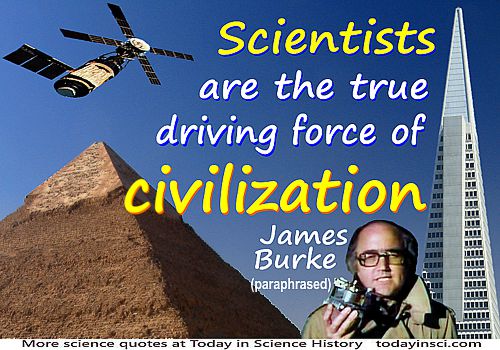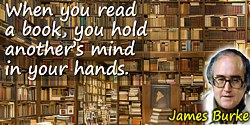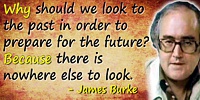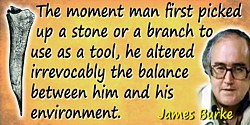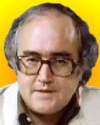 (source)
(source)
|
James Burke
(22 Dec 1936 - )
Science historian best known for his 1979 TV series, Connections.
|
James Burke - Scientists are the true driving force of civilization
Illustrated Quote - Medium (500 x 350 px)
More James Burke quotes on science >>
Context of quote “Scientists are the true driving force of civilization”
In his 1979 TV series, Connections, James Burke presented a seemingly rambling path through the history of science and technology. He intended that he would not follow any familiar linear path progressing inevitably as one discovery or invention was skillfully and intentionally developed to the next level until the present. Instead, his innovative style was to weave together separate threads cross-linking and zig-zagging between the events, circumstances, accidents and serendipity that triggered and influenced the discoveries and inventions. Burke showed how ultimately, they combined to advance the science and technology that has so much changed civilization.
The final episode of ten hour-long programmes was titled “Yesterday, Tomorrow and You.”1 He summarized the main themes from the preceding episodes, and ended with philosphical conclusions and an outlook for the future. He said:
“The key to why things change is the key to everything. How easy is it for knowledge to spread? And that, in the past, the people who made change happen, were the people who had that knowledge, whether they were craftsmen, or kings. Today, the people who make things change, the people who have that knowledge, are the scientists and the technologists, who are the true driving force of humanity.”
Then he expressed his opinion that the views presented by art, music and literature that appeal to human emotions, were interpretions of the world that are merely reflections of the person producing them. By contrast, he stated:
“Scientific knowledge is hard to take, because it removes the reassuring crutches of opinion, ideology, and leaves only what is demonstrably true about the world.”
The webmaster has not found a primary source for a verbatim version of the short quote at the top of this page, which was found on the web.2 Until then, he believes the quote is an effective paraphrase of the sentiments expressed in the above narration.
2 Cosmic Search (Fall 1981), 3 No. 4, 18.
- Science Quotes by James Burke.
- 22 Dec - short biography, births, deaths and events on date of Burke's birth.
- James Burke - context of quote “Scientists are the true driving force of civilization” - Large image (800 x 600 px)
